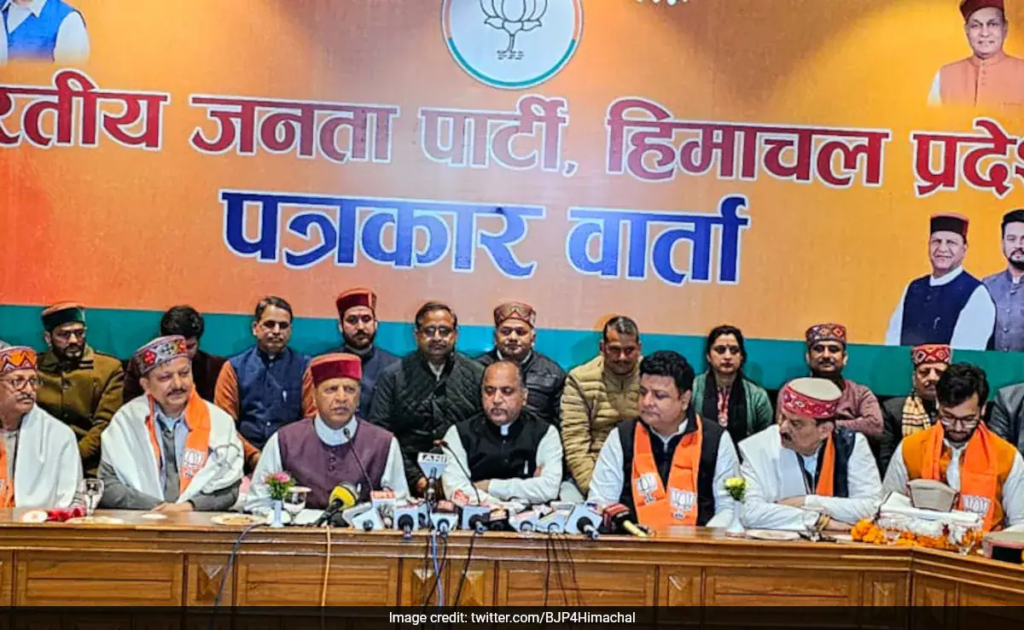BJP’s Strategic Moves
In a calculated political maneuver, the Bharatiya Janata Party (BJP) has strategically named its candidates for assembly bypolls across several states, including Himachal Pradesh and Gujarat. Notably, the party has chosen to field six disqualified MLAs from Himachal Pradesh who recently defected from the Congress, marking a significant shift in the state’s political landscape. Concurrently, the BJP has capitalized on the resignations of several Gujarat MLAs, including former Congress members who have crossed party lines, by nominating them for bypolls. These decisions underscore the BJP’s concerted efforts to strengthen its foothold in these regions and consolidate power.

The repercussions of these strategic nominations are particularly pronounced in Himachal Pradesh, where the BJP has selected Sudhir Sharma for Dharamshala, Ravi Thakur for Lahaul and Spiti, Rajinder Rana for Sujanpur, Inder Dutt Lakhanpal for Barsar, Chetanya Sharma for Gagret, and Devinder Kumar Bhutto for Kutlehar constituencies. These individuals, formerly aligned with the Congress, were disqualified for disregarding a party whip and supporting the BJP candidate in a crucial Rajya Sabha poll. Their defection not only dealt a severe blow to the Congress but also signaled a significant shift in political allegiance within the state.
Similarly, in Gujarat, the BJP’s nominations for bypolls to five seats include prominent figures like Arjun Modhvadiya, Chatursinh Chavda, and Arvind Ladani, all of whom recently switched allegiance from the Congress to the BJP. The party’s decision to field these individuals reflects its strategy of capitalizing on discontent or dissatisfaction within rival parties and leveraging it to expand its own influence.
Beyond these states, the BJP has also named candidates for bypolls in West Bengal, Karnataka, and Sikkim. In West Bengal, where the political landscape is fiercely contested, the party is positioning itself strategically by nominating candidates for two crucial seats. Similarly, in Karnataka, the BJP is making calculated moves to strengthen its presence by contesting a bypoll seat. Meanwhile, in Sikkim, where assembly elections coincide with Lok Sabha polls, the BJP’s decision to sever ties with the ruling Sikkim Krantikari Morcha underscores its ambition to independently assert its dominance in the region.
The BJP’s involvement in these bypolls underscores its overarching strategy of expansion and consolidation. By strategically fielding disqualified MLAs and capitalizing on defections from rival parties, the BJP aims to not only secure victories in these bypolls but also send a message of dominance and resilience. These nominations are not merely tactical decisions but indicative of the BJP’s broader political calculus, which prioritizes maximizing electoral gains and solidifying its position as a formidable political force.
Moreover, the timing of these nominations is crucial, as they come at a time when political dynamics are evolving rapidly, both at the state and national levels. With the specter of impending assembly elections looming large in several states, including Uttar Pradesh and Punjab, the BJP’s strategic maneuvering in these bypolls serves as a precursor to its broader electoral strategy. By securing victories in these bypolls, the BJP aims to bolster its electoral momentum and project an image of invincibility ahead of crucial state and national elections.
However, while the BJP’s strategic nominations may yield short-term electoral gains, they also raise pertinent questions about the state of democracy and political ethics. The phenomenon of disqualified MLAs switching parties for political gain highlights the prevalence of opportunistic politics and raises concerns about the integrity of elected representatives. Furthermore, the BJP’s aggressive pursuit of power through defections and strategic nominations underscores the increasingly polarized and competitive nature of Indian politics, where loyalty to party ideologies often takes a backseat to the pursuit of power.
In conclusion, the BJP’s decision to field disqualified MLAs and former rival party members in crucial bypolls across multiple states underscores its strategic prowess and ambition for electoral dominance. These nominations are emblematic of the party’s relentless pursuit of power and its willingness to exploit political opportunities to further its agenda. However, they also raise important questions about the ethical dimensions of political defections and the integrity of democratic processes. As these bypolls unfold, they are likely to shape the political landscape of these states and set the stage for larger electoral battles in the future.

[…] Tragedy on the Francis Scott-Introduction: […]